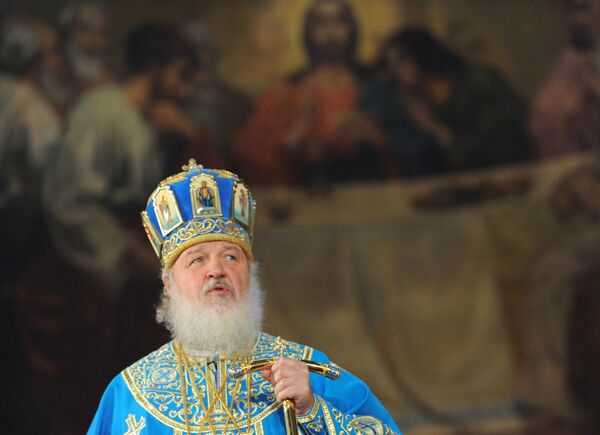Patriarch Kirill of Moscow and All Russia has led important changes in the country, which included the introduction of chaplains in military units and the launch of Orthodox culture courses teaching in schools a year since he was enthroned as head of the world's largest Orthodox Church.
Kirill held a Divine Liturgy in downtown Moscow's Christ the Savior Cathedral on Monday, and received congratulations afterwards. Over 100 bishops, including from other countries, came to congratulate the patriarch during festivities also attended by President Dmitry Medvedev and his spouse, as well as by 3,000 believers.
Metropolitan Kirill of Smolensk and Kaliningrad was elected as the 16th Patriarch of Moscow and All Russia in late January 2009 by the Local Council of the Russian Orthodox Church that numbers more than 135 million members worldwide, succeeding Patriarch Alexy II, who died in December 2008 at the age of 79. Kirill was enthroned February 1 last year, at a ceremony also held in the Christ the Savior Cathedral.
Kirill, widely seen as a reformist, has won prominence by becoming the first top Orthodox priest to anchor a television show. After becoming patriarch he launched a new practice for the Orthodox leader: meeting large youth audiences at stadiums, answering their questions and delivering sermons.
Kirill, who has strong support from the Kremlin, has said he sees reviving national spirit and morals damaged in the years of Communism and post-Soviet turmoils as his task.
He has advocated reviving the practice of army chaplains abandoned after Bolsheviks came to power in 1917 and teaching religion in school, when schoolchildren and their parents can choose between being taught the basics of four traditional Russian faiths (Orthodoxy, Islam, Judaism or Buddhism) or the basics of secular ethics - an experiment that is to embrace the whole of Russia from 2012.
Prime Minister Vladimir Putin congratulated Patriarch Kirill on the anniversary of enthronization.
"Under your leadership, the dialogue of the Church with state and public organizations in the resolution of important social problems is notably expanding and is being filled with new content. The influence of the Russian Church and Moscow Patriarchate is growing not only in Russia but also abroad," it said.
Kirill has contributed to the improvement of relations between the Russian Orthodox Church and the Holy See. As head of the Russian Orthodox Church's external relations for more than a decade, he had led dialogue with the Vatican and other churches.
The enthronement of Patriarch Kirill, who was seen as a liberal in the largely traditionalist church, was welcomed by the Roman Catholic Church.
In December 2009, Moscow and the Vatican exchanged notes formalizing the establishment of full diplomatic relations. Since 1990, the two sides maintained diplomatic representation below the level of ambassador. Now, Russia has a full-fledged embassy in Vatican.
As a result of the Great Schism, Christianity split in 1054 AD into the Eastern branch (the Orthodox Church) and the Western branch (the Roman Catholic Church). They have a number of theological and political differences.
Prince Vladimir baptized medieval Kievan Rus, which comprised parts of modern-day Russia, Ukraine and Belarus, in the year 988. The canonical Orthodox Churches in the ex-Soviet Ukraine and Belarus are subordinate to the Russian Orthodox Church.
Kirill's first year showed that he could also be tough in translating good relations with the state into more power for the church.
As patriarch, Kirill reached agreement with state leaders that the Church will be given back seized property. A long-delayed law on returning religious property seized by the Bolsheviks recently got a push forward from Putin.
MOSCOW, February 1 (RIA Novosti)


